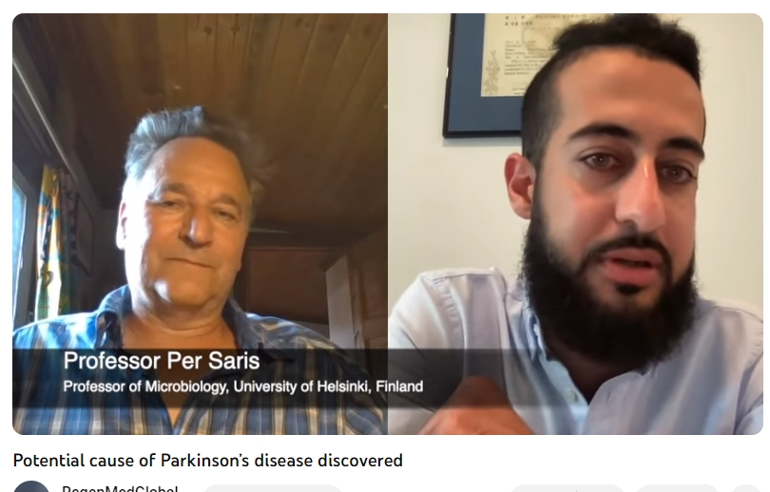youtu.be/kF_Gg-oUu4w?si=1zZ...
------------------------------------

youtu.be/kF_Gg-oUu4w?si=1zZ...
------------------------------------
The cause of Parkinson's is aberrant, or excess, alpha synuclein. The body's handling of alpha synuclein is so shaky that over 20 genetic mutations have been documented to cause Parkinson's, plus a handful of toxic substances. Could a bacteria be added to this list? Possibly, but to label it as the cause is not correct.
I believe Desulfovibrio could be a cause. We have a number of good posts on this: healthunlocked.com/cure-par...
It does not nmatter what caused the PD but, ir does matter gow you go about dealing with it. People on this sight must be sick and tired of seeing me tell everybody about how I overcome my PD, many years ago. I DID FAST WALKING, for one hour, every secondd day. Thatwas no problem.
Within 2 years I was free of the PD and have stayed thagt way every since and I am now 89 years old and sytill walk and am still PD-free. But, and this is a big BUT, If I stop doing it, then my PD comes back again to haunt me!
I’m not sure what you mean by every second day? Would that be Monday Wednesday Friday Sunday Tuesday? Also what do you do on the days off? I’ve been fast walking every day for 30 minutes plus 30
Minutes on exercise bike plus Rock steady boxing 2 times a week. I take c/l 2 tabs 4 x a day plus maybe a dose in the night. I do a plant based diet and have lost 50 lbs. My symptoms are slowly getting worse. Dystonia in right foot, Weakened hands, can barely sign my name. lightheaded and foggy. Occasional constipation. Mush mouth talking. Problems with vision. Gait problems and balance issues. Symptoms are bad Especially as c:/ l wears off and while waiting for new dose to start working . Sigh.
Hi Gallowglass. You are not hearing my message properly! At least it does not arrear to me that you have.
All your body needs is to put maximum effort into the wlking, after having warmd-up. Measure th distance travelled and the time taken , so that you can see your speed in Ks per hour. You must rest youtr muscles for 24 hours before doing the walking again. Inthagt way you can measure your improvement and it will encourage you to do more!
You can also do weightds and loosening-up exercises on the in-between days, but do not extend yourself. Good luck!
John
Hubbys GI map just came back with slightly elevated desulfovibrio, so we’ll be trying to knock that down for sure!
HOW?
So far using inulin (FOS), probiotics, AIP diet (low sugar, no gut irritants) We’re also getting ready to try more suggestions from a functional medicine doctor (who ordered the GI map)
I have no more than a high school degree. You might look into Berberine:
Effects of Berberine on the Gastrointestinal Microbiota 2021 ncbi.nlm.nih.gov/pmc/articl....
"Berberine is also known to reduce the diversity of the GM and interfere with the relative abundance of Desulfovibrio, Eubacterium, and Bacteroides (Cui et al., 2018b). In addition, Bacteroides were shown to be enriched in the colon and terminal ileum of mice (C57BL/6) treated with berberine, but berberine treatment reduced the populations of Ruminococcus gnavu (Genus of Mediterraneibacter), Ruminococcus schinkii (Genus of Blautia), Lactobacillus acidophilus (Genus of Lactobacillus), Lactobacillus murinus (Genus of Ligilactobacillus), and Lactococcus lactis (Genus of Lactococcus) (Guo et al., 2016). Recent studies have shown that berberine has beneficial effects on the immune cells of the intestinal immune system and affects the expression of several intestinal immune factors. Berberine has also been shown to inhibit the mRNA expression of interleukin (IL)-1β, IL-4, IL-10, macrophage migration inhibitory factor (MIF), and tumor necrosis factor (TNF)-α, while also reducing low-grade inflammation (Gong et al., 2017). Short-term exposure to berberine alters the populations of intestinal bacteria by reducing the activity of Clostridium cluster XIVa and IV, and their bile salt hydrolase (BSH), thus leading to the accumulation of taurocholic acid (TCA). TCA can activate intestinal farnesoid X receptor (FXR) which can then mediate the metabolism of bile acids, lipids, and glucose (Tian et al., 2019). Butyrate is a short-chain fatty acid (SCFA) produced during fermentation of fibers and other substrates by an anaerobic bacteria resident in the gastrointestinal tract (Roediger et al., 1982). Berberine has also been shown to enrich the population of butyrate-producing bacteria in the GM, thus promoting the synthesis of butyrate via the acetyl CoA-butyryl CoA-butyrate pathway. Subsequently, the butyrate enters the blood and reduces the levels of lipids and glucose (Wang et al., 2017b)."